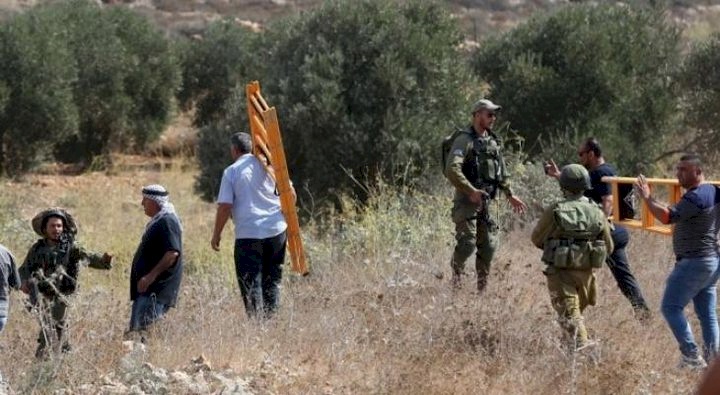
Areej: About 25,000 Dunams Prevented by Occupation from Accessing for Olive Picking
SadaNews - The Applied Research Institute "Areej" reported that more than 25,000 dunams of land planted with olive trees, near settlements and colonial outposts in all governorates of the West Bank, are blocked by the Israeli occupation, preventing their owners from approaching and entering to harvest the olives.
Areej added in a report today, Thursday, that according to the analysis conducted by the institute, there have been 96 military orders issued by the occupation regarding more than 25,000 dunams of land cultivated with olive trees, with the largest targeting of the following governorates: Jenin, Jerusalem, Qalqilya, and Ramallah.
The report indicated that since the beginning of this year, the institute has recorded more than 3,100 assaults carried out by settlers against Palestinians and their properties, agricultural lands, and natural resources, causing significant damage.
The report also revealed that the institute has recorded the uprooting, destruction, and burning of approximately 13,000 trees, either by uprooting, burning, or destruction since the beginning of this year, at the hands of settlers and Israeli occupation forces, most of which are olive trees in various governorates of the West Bank.
The occupation authorities continue year after year to issue military orders preventing Palestinians from accessing their olive-grove lands, especially those on which settlements or colonial outposts have been established on or near them, as part of a repeated policy aimed at the gradual takeover of Palestinian lands, through temporary prohibitions, gradually leading to permanent bans.
The institute pointed out that the issued Israeli orders do not cover the isolated lands west of the separation wall, which have practically become semi-isolated from their owners, exacerbating the suffering of farmers and limiting their ability to benefit from their lands and secure their annual livelihood from olive sales, as the landowners are targeted by reducing the number of permits granted to them to access their lands (west of the wall).
It emphasized that Israeli military orders are one of the prominent colonial tools used by the Israeli occupation authorities to seize Palestinian lands, especially in areas classified as "C", which remain under full Israeli security and administrative control.
The institute concluded: these practices contradict international humanitarian law and the Fourth Geneva Convention, which prohibits the occupying power from seizing private property or making any permanent changes to the occupied territories. Establishing settlements and transferring the population of the occupying state to the occupied territories constitutes a blatant violation of Article 49 of the same convention and a breach of Security Council resolutions, particularly Resolution 2334 of 2016, which affirms the illegality of settlements in the Palestinian territories occupied in 1967.

17 Martyrs in the Last 48 Hours in Gaza

11 Martyrs, Including Children and Women, in Israeli Airstrikes on Gaza

Arrests During Israeli Occupation Forces' Incursion into Various Areas of the West Bank

Report: Trump May Order Attack on Iran Next Sunday

Trump: Iran Wants to Reach an Agreement.. and Knows the "Deadline"

Shaath: Rafah Crossing will be opened in both directions starting next Monday

America Imposes Sanctions on Several Iranian Officials Including the Interior Minister

